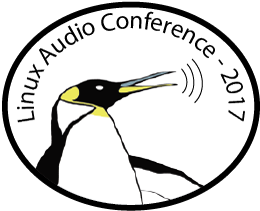

Workshops
14:30
ROOM E11: 1-Yoshimi and the reluctant developer by Will Godfrey (United Kingdom)
ROOM E12: 2. Building a local linux audio community by Daniel Appelt (Germany)
16:30
ROOM E11: 3. Origin, features and roadmap of the MOD* Duo by Mauricio Dwek, Gianfranco Ceccolini & Filipe Coelho (Germany)
ROOM E12: 4. Too Much Qstuff* To Handle by Rui Nuno Capela (Portugal)
14:00
ROOM E11: 5. Free Software and DIY at Radio Panik by Frederic Peters, Arthur Lacomme and Suzie Suptille (Belgium)
ROOM E12: 6. Interactive music with i-score by Jean-Michaël Celerier (Laboratoire Bordelais de Recherche en Informatique, France)
16:00
ROOM E11: 7. Moony – rapid prototyping of LV2 (MIDI) event filters in Lua by Hanspeter Portner (Switzerland)
ROOM E12: 8. Generative Music with Recurrent Neural Networks by Kosmas Giannoutakis
(Institut für Elektronische Musik und Akustik Inffeldgasse, Graz, Austria)
15:00
ROOM E11: 9. Smartphone Passive Augmentation by John Granzow* & Romain Michon**
(* University of Michigan - United States, ** Stanford University - United States)
1-Yoshimi and the reluctant developer by Will Godfrey (United Kingdom)
A workshop overview of my involvement with the Yoshimi soft-synth, discussion and current status, including demonstrations
See https://sourceforge.net/projects/yoshimi/
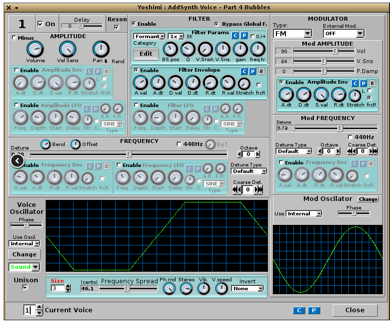
2. Building a local linux audio community by Daniel Appelt (Germany)
The Open Source Audio Meeting Cologne is a monthly gathering of audio and free software enthusiasts. This workshop provides insights how such a regular event may be organized.
See http://cologne.linuxaudio.org
3. Origin, features and roadmap of the MOD* Duo by Mauricio Dwek, Gianfranco Ceccolini & Filipe Coelho (Germany)
(* Musical Operating Devices For Experienced Musicians)
In this workshop, MOD Devices tells its story and shows its heavy use of Linux Audio technologies for the MOD Duo.
The workshop will consist of:
The audience will be encouraged to get their hands on the device and try out its features.
See https://moddevices.com/
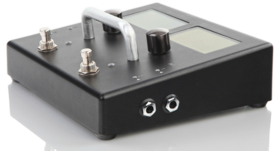
4. Too Much Qstuff* To Handle by Rui Nuno Capela (Portugal)
Following in the tradition of LAC2013@IEM-Graz, LAC2014@ZKM-Karlsruhe, LAC2015@JGU-Mainz and miniLAC2016@c_base-Berlin, this talk/workshop is once again being proposed as an informal opportunity for open debate and discussion, over the so called Qstuff* software constellation. Although starring Qtractor [4] as the main subject, all users and developers are welcome to attend, whether or not they're using any of the Qstuff*. An all-inclusive talk/workshop.
The Qstuff* are, in order of appearance:
[1] QjackCtl - A JACK Audio Connection Kit Qt GUI Interface
http://qjackctl.sourceforge.net
https://github.com/rncbc/qjackctl
[2] Qsynth - A fluidsynth Qt GUI Interface
http://qsynth.sourceforge.net
https://github.com/rncbc/qsynth
[3] Qsampler - A LinuxSampler Qt GUI Interface
http://qsampler.sourceforge.net
https://github.com/rncbc/qsampler
https://github.com/rncbc/liblscp
[4] Qtractor - An audio/MIDI multi-track sequencer
http://qtractor.org
http://qtractor.sourceforge.net
https://github.com/rncbc/qtractor
[5] QXGEdit - A Qt XG Editor
http://qxgedit.sourceforge.net
https://github.com/rncbc/qxgedit
[6] QmidiNet - A MIDI Network Gateway via UDP/IP Multicast
http://qmidinet.sourceforge.net
https://github.com/rncbc/qmidinet
[7] QmidiCtl - A MIDI Remote Controller via UDP/IP Multicast
http://qmidictl.sourceforge.net
https://github.com/rncbc/qmidictl
[8] synthv1 - an old-school polyphonic synthesizer
http://synthv1.sourceforge.net
https://github.com/rncbc/synthv1
[9] samplv1 - an old-school polyphonic sampler
http://samplv1.sourceforge.net
https://github.com/rncbc/samplv1
[10] drumkv1 - an old-school drum-kit sampler
http://drumkv1.sourceforge.net
https://github.com/rncbc/drumkv1
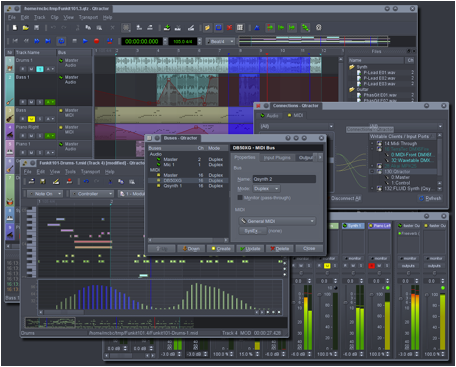
5. Free Software and DIY at Radio Panik by Frederic Peters, Arthur Lacomme and Suzie Suptille (Belgium)
Radio Panik is a community FM-radio created in Brussels in 1983, it has been using, adapting and creating free software for much of its activity for years. This workshop aims to explore and discuss our current audio practices, from broadcast systems to creative tools.
See http://www.radiopanik.org/
6. Interactive music with i-score by Jean-Michaël Celerier
(Laboratoire Bordelais de Recherche en Informatique, France)
This workshop presents the i-score (www.i-score.org) sequencer.
It will present the challenges and the rationale that led to the creation of the software, that is, providing a dedicated tool for temporal design in an interactive context.
The construction of a score will be detailed on practical examples involving audio-visual features and interaction with a familiar creative coding environment such as PureData, openFrameworks or Processing.
See http://www.i-score.org
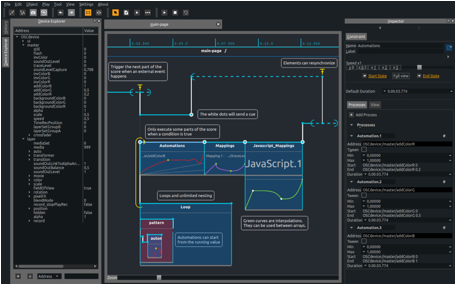
7. Moony – rapid prototyping of LV2 (MIDI) event filters in Lua by Hanspeter Portner (Switzerland)
In need of a specific event filter not yet existent for your DAW/live setup? Neither time nor skill to write a MIDI plugin in C/C++?
The Moony LV2 plugin comes to the rescue and lets you script realtime filters in Lua on-the-fly for any LV2 host. Come and learn about the LV2 atom event system and rapid prototyping in Lua.
See https://open-music-kontrollers.ch/lv2/moony/
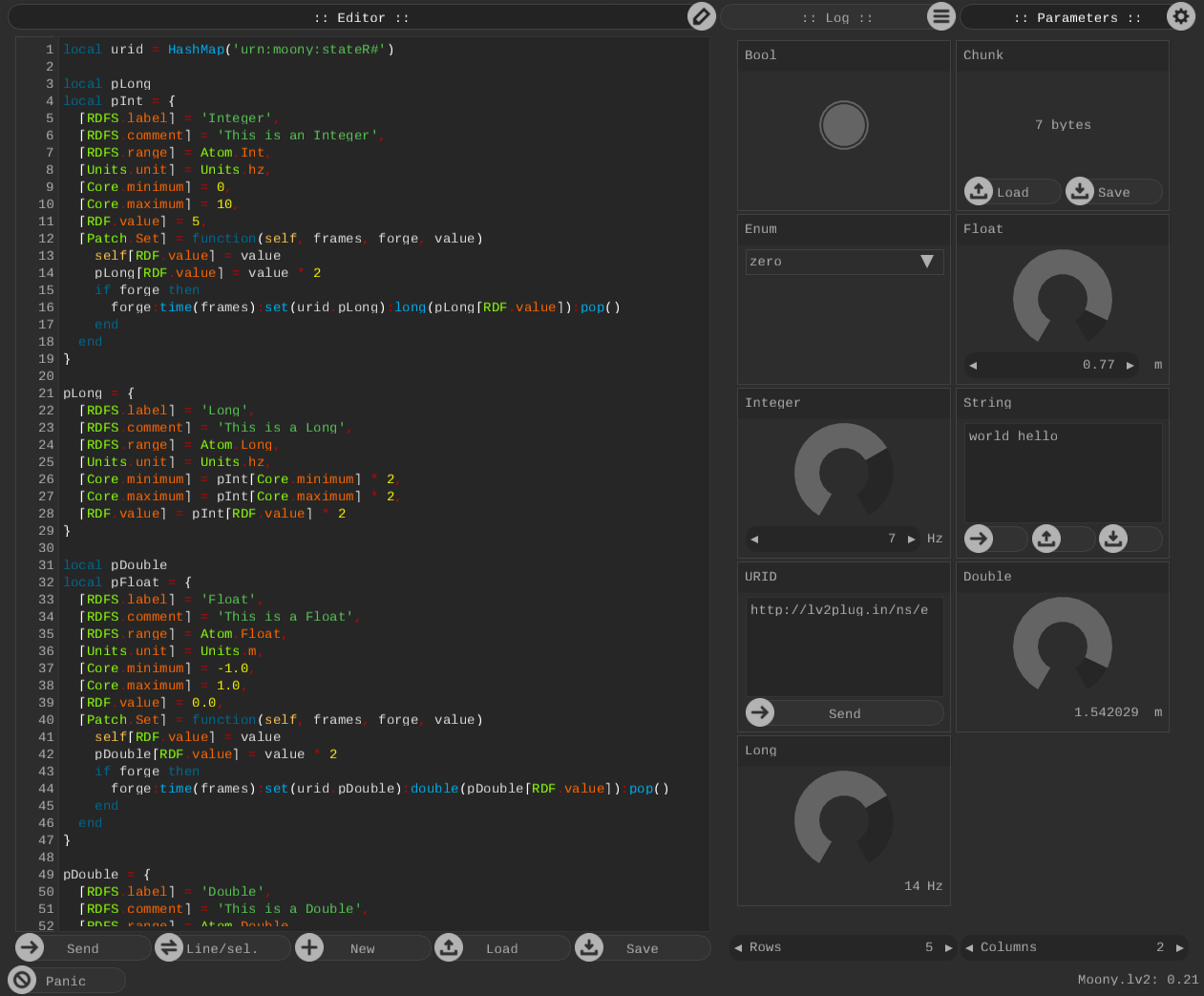
8. Generative Music with Recurrent Neural Networks by Kosmas Giannoutakis
(Institut für Elektronische Musik und Akustik Inffeldgasse, Graz, Austria)
In this workshop the generative music capabilities of artificial recurrent neural networks will be explored, using an abstractions library for the programming environment Pure Data, called RNMN (Recurrent Neural Music Networks). The library provides the basic building blocks, neurons and synapses, which can be arbitrarily connected, easily and conveniently, creating compound topologies. The framework allows real time signal processing, which permit direct interactions with the topologies and quick development of musical intuition. For the workshop, a laptop with a build-in microphone, Pure Data (PD-vanilla 0.47.1 version is recommended) installed and headphones is required for the participants. Experience with visual programming
is a plus but not a necessary prerequisite. It will be explained the basic principles of the framework and it will be demonstrated the construction of some basic topologies. In the end the participants can create their own topologies which can demonstrate to the other participants.
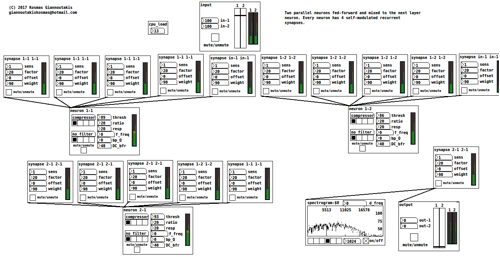
9. Smartphone Passive Augmentation by John Granzow* & Romain Michon**
(* University of Michigan - United States, ** Stanford University - United States)
In this 4 hours workshop (2 sessions) we will present Mobile3D, a library for introducing passive musical augmentations to mobile phones. The library allows participants to quickly leverage the parametric features of OpenScad a functional programming language for text based computer assisted drawing (CAD). Several 3D printers will be on hand to materialize designs. The workshop gives participants the tools to customize their smartphones for musical interaction.
See https://ccrma.stanford.edu/~rmichon/mobile3D/
